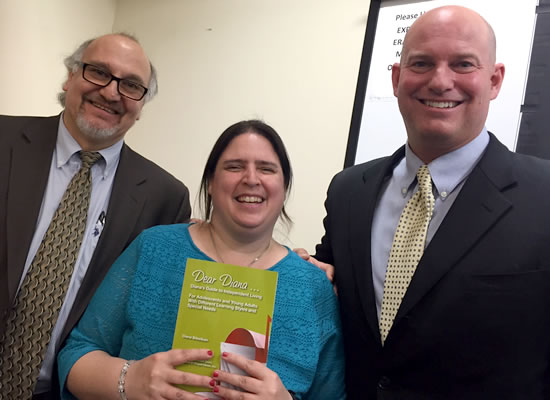Diana Bilezikian & Existentialism
By Dr. Beatrice L. Bridglall

(L-R) Dr. Gerard Costa, Director, Center for Autism and Early Childhood Mental Health, Montclair State; Author Diana Bilezkian;& Michael Storz, President, Chapel Haven Inc.
The insights from author Diana Bilezikian’s new book, Dear Diana … Diana’s Guide to Independent Living For Adolescents and Young Adults with Different Learning Styles and Special Needs (AAPC Publishing, 2014), took on new relevance during her book talk with faculty, staff, students and friends at Montclair State University on April 25, 2016. Diana discussed the genesis of her book, which began at the suggestion of her cousin, Nancy Barnett. The art of writing with clarity, meaning and substance is not an easy task, irrespective of whether one has special needs or different learning styles. Diana’s audience was fascinated with her recounting of the long, sometimes arduous process of conceptualizing her book, to dilemmas of editing and revising and finally, the publication stage.
Diana fielded complex questions from her audience in a poised, relaxed manner. Indeed, I do not believe that someone without her experience would have emphasized the importance of not only asking the right kinds of questions in efforts to genuinely understand seemingly simple situations, but also listening deeply to the answers so that the appropriate solutions can be thought of, implemented and adapted if necessary. She spoke eloquently of several of her own teachers, who gave her new ways of approaching tasks and difficult concepts, especially in mathematics. In doing so, she reinforced the significance of utilizing creative approaches in tailoring curriculum and instruction to enable student learning and transfer, regardless of whether or not the student is one with special needs or different learning styles.
As I listened to Diana engage with her audience for close to 2 hours, I realized that she is an existentialist in that she is not advocating for the use of current principles emerging from the scientific study of those with special needs and different learning styles, rather she trusts her own intuitions, which is at the heart of her own existence. That is, while the focus in the special needs domain uses the logic of science to understand those with special needs, Diana is guided by the logic and intuition of her heart, which as Pascal suggests, has its reasons that reason cannot and does not know. As such, she asserts, without openly advocating for it, the salience of patience, compassion, understanding and support as critical elements in engaging with those with special needs. This mature, witty and charming woman is emblematic of the success that others with special needs can enjoy when they are taken seriously and supported in ways that honors their need for independence and their potential to inspire and elevate not only themselves but the world. #
Dr. Beatrice L. Bridglall, Fulbright Specialist in Higher Education; Director, Office of Special Projects, Office of the Secretary of Higher Education, New Jersey.
